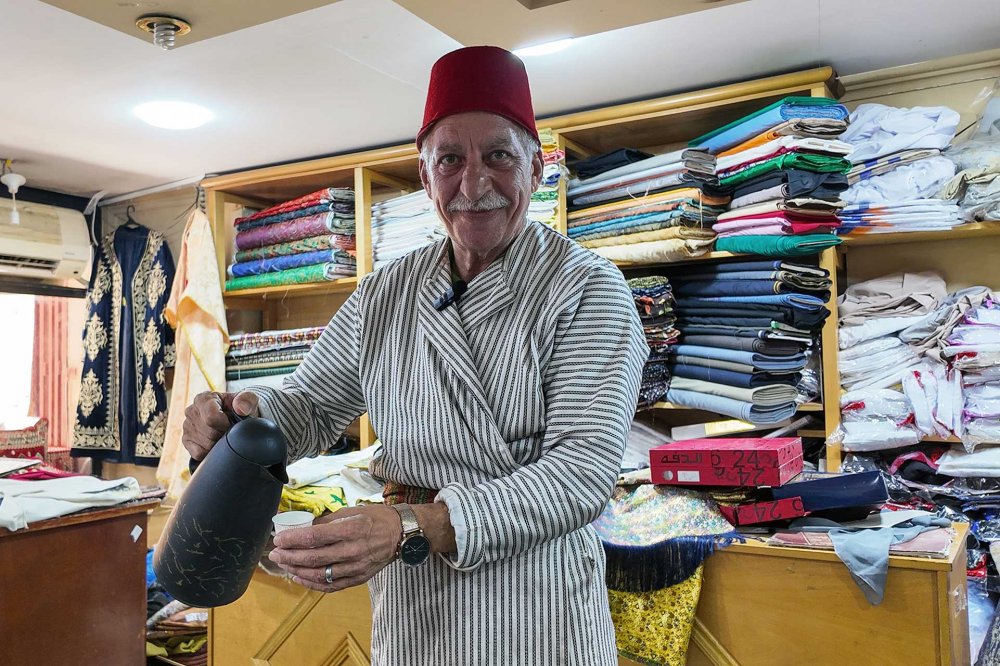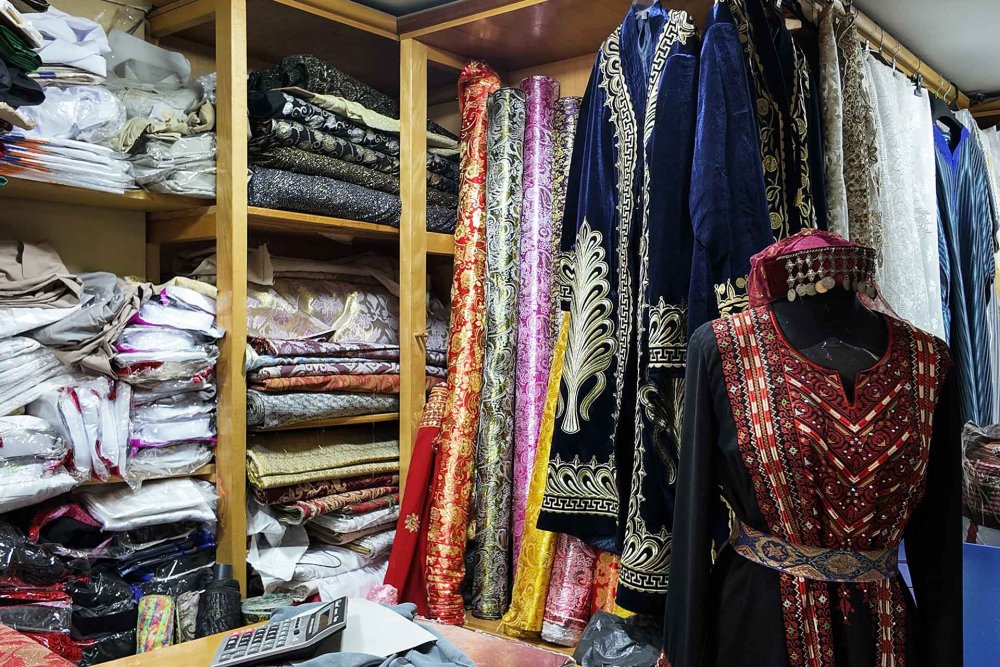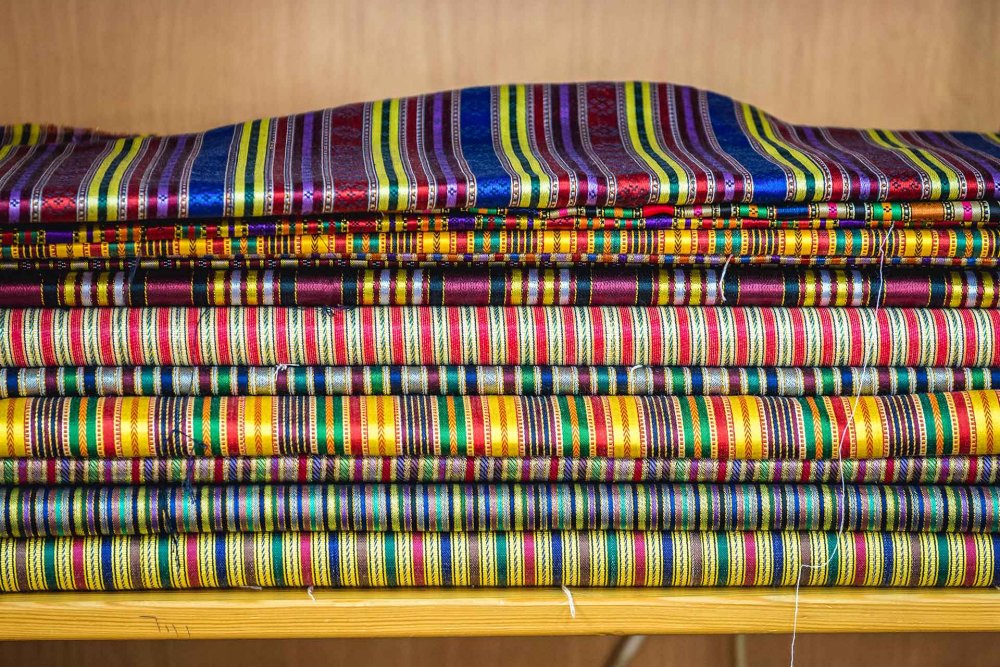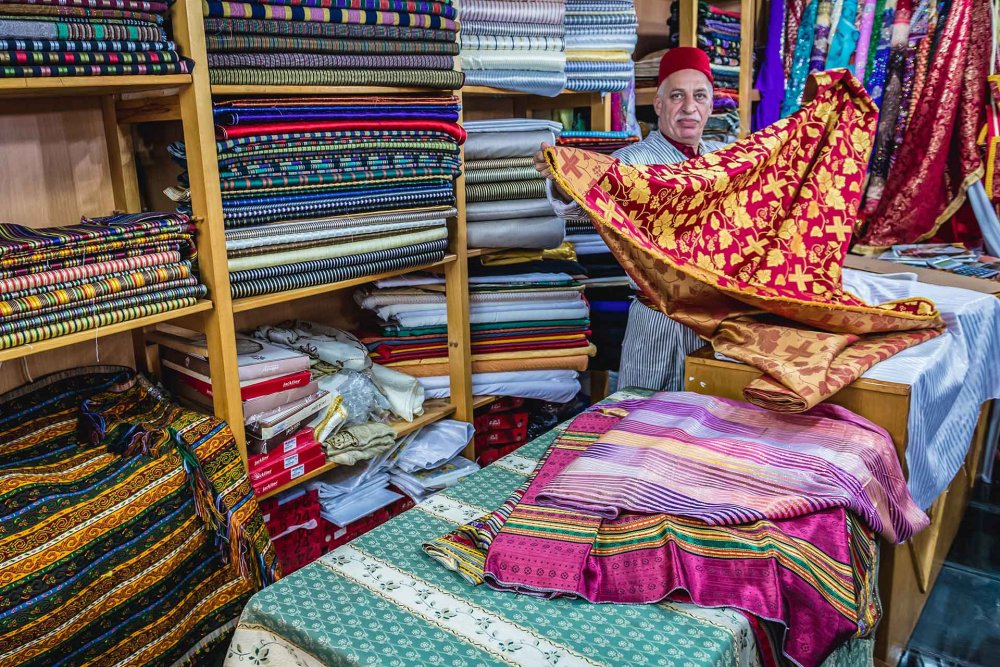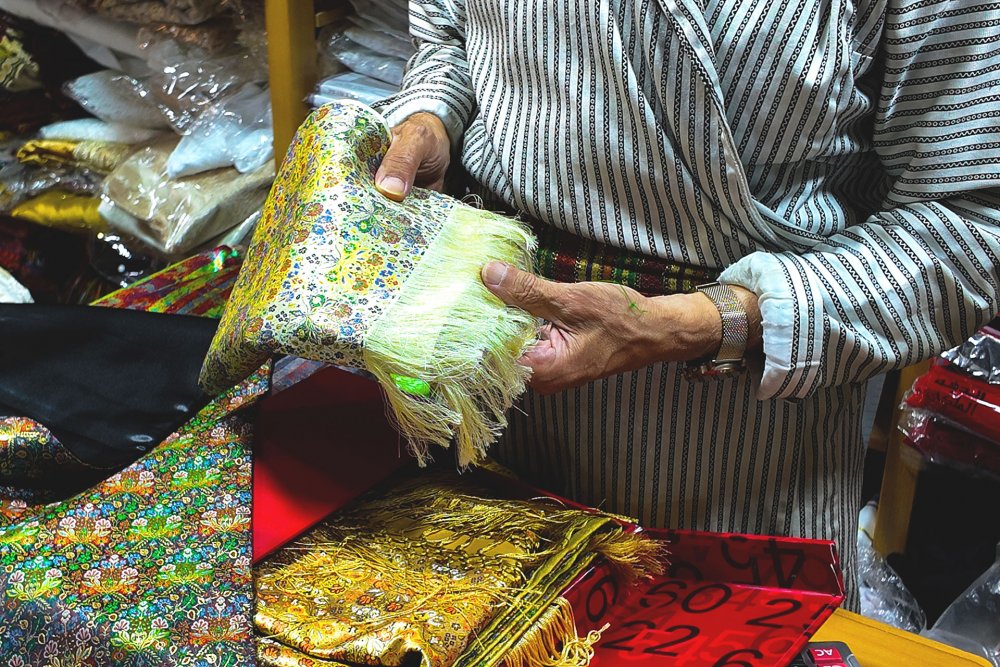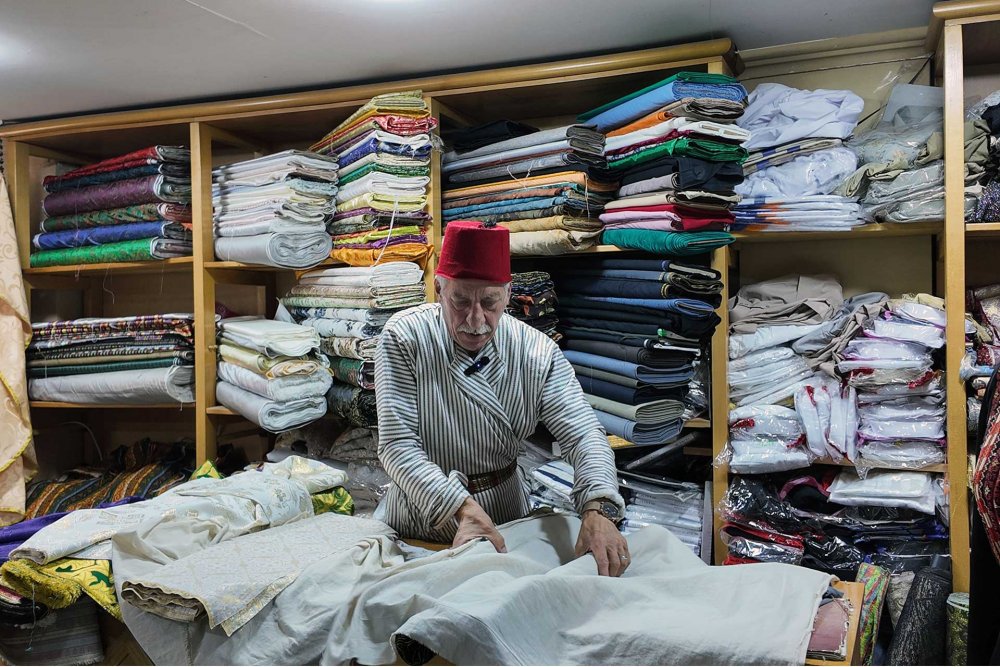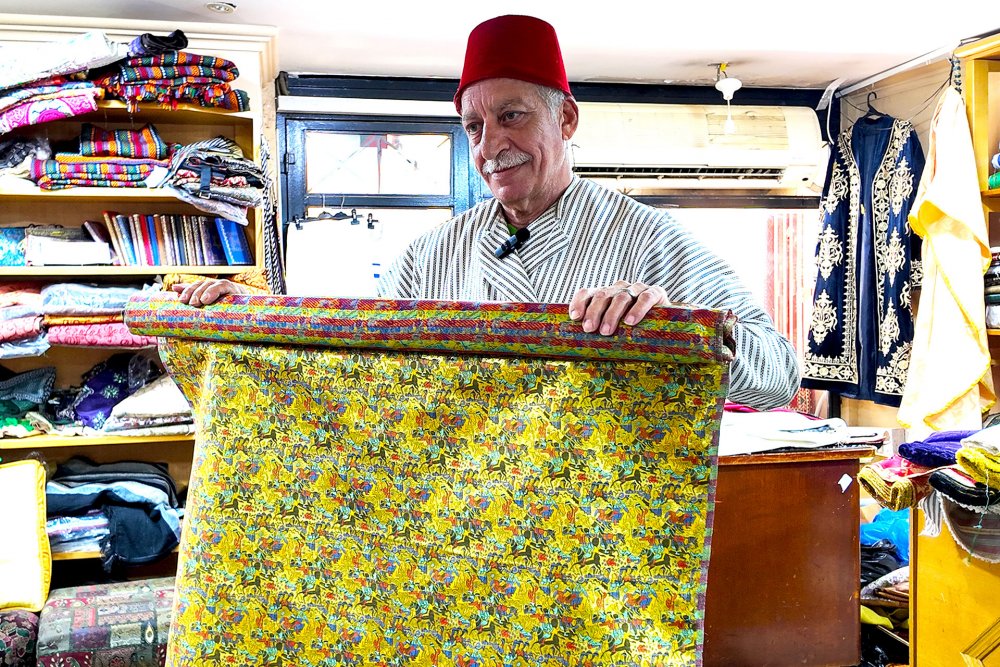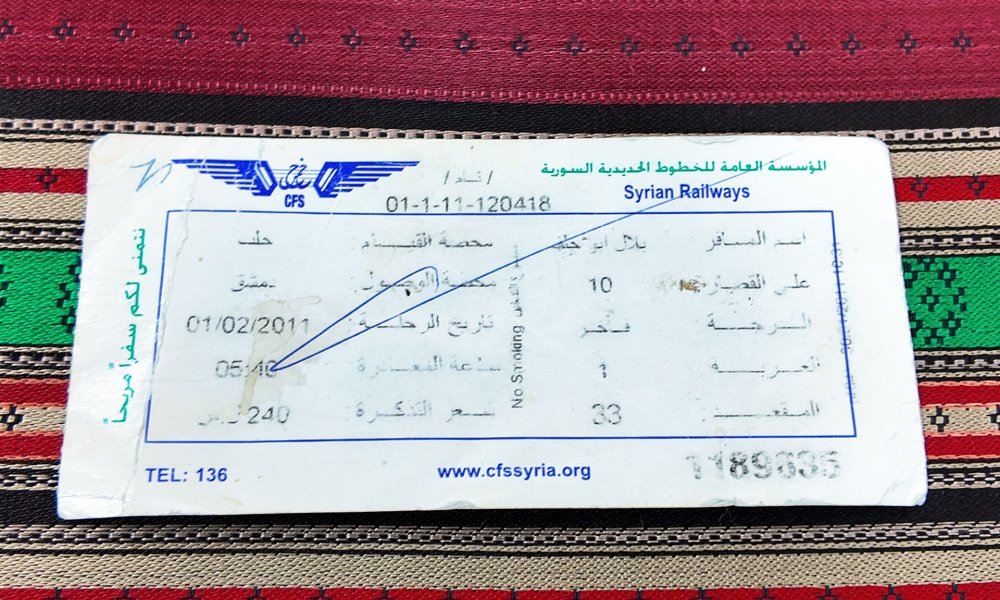Introduction
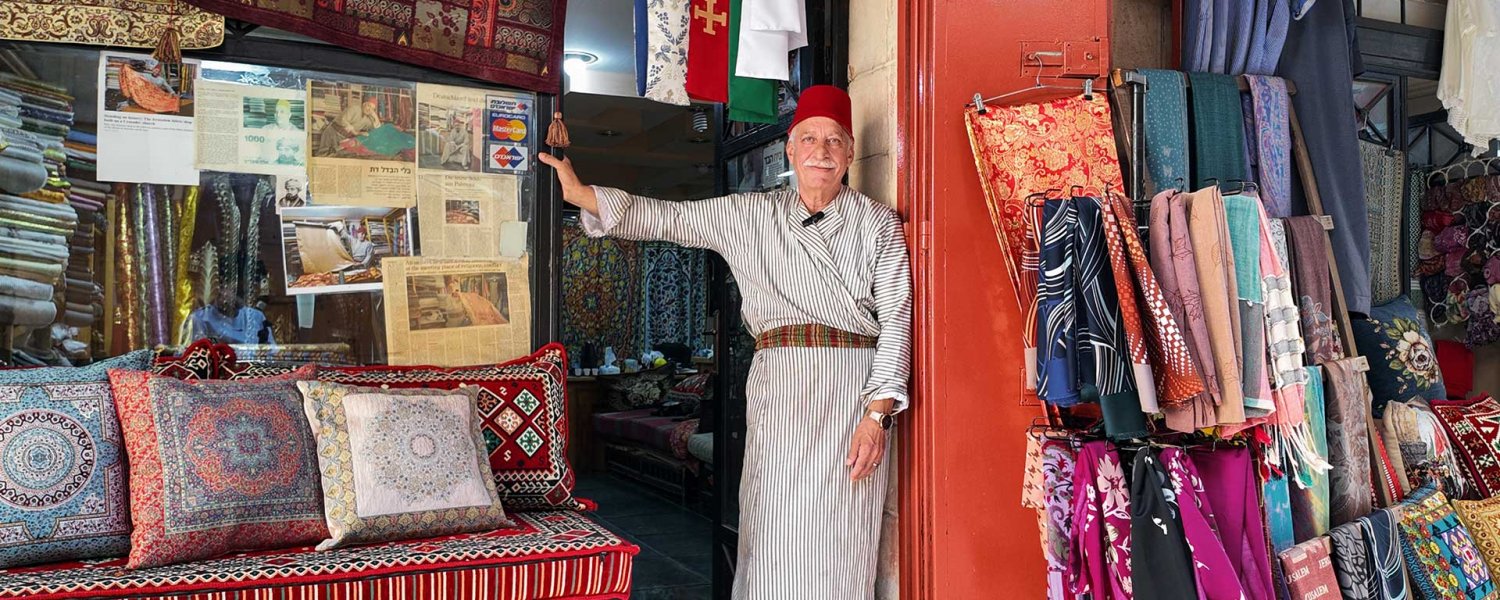
Credit:
Mays Shkerat for Jerusalem Story
At a Little Shop in the Old City of Jerusalem, Textile Designs Have History to Tell
Known locally as the “fabric man,” Bilal Abu Khalaf stepped into the family business at a young age over 40 years ago. A local personality who has piqued others’ interest for most of his life, Bilal has a fabric shop that sits just steps away from the Church of the Holy Sepulchre in the Old City of Jerusalem, right across from the Lutheran Church of the Redeemer on Aftimos Street (the Greek Market, also known as the Muristan) and up the stairs ahead of the fountain (dating back to 1903 in honor of the Ottoman sultan Abdul Hamid II).
On Monday, July 22, 2024, Jerusalem Story met with the “fabric man” in his shop. The neighboring shopkeepers were delighted: “You’re here for Bilal Abu Khalaf? Let me take you there!” one of them proclaimed.1
Since October 7, 2023, Aftimos Street—usually packed with tourists and pilgrims—has lain quite empty. The ghostly quiet in the normally bustling street is so striking in mid-2024 that seeing people looking for a fabric shop in the Old City of Jerusalem almost looks bizarre.
“Welcome to the fabric man’s shop!” the neighboring shopkeeper exclaimed as the team walked inside. The shop had various swathes and rolls of sumptuous fabrics as well as robes, purses, and other clothing. The space was neatly set up. “I had actually been looking for an excuse to get me some of this freshly brewed coffee!”2 Bilal said as he stood up with a cheerful smile and a gracious demeanor. It was clear he was none other than the “fabric man”; there were some photos of him clipped from various newspaper articles affixed to the glass door.
“Yes, this is good coffee,” he affirmed and stirred delicious freshly brewed coffee into tiny cups. Clearly, Bilal is used to meeting people from different parts of the world. His particular store has gained international recognition, but the street itself also long assumed importance. For decades, it has offered millions of tourists and pilgrims an overflowing selection of products such as leather goods, souvenirs, gold and silver cosmetics, amulets, T-shirts, clothing materials, and—in Bilal’s case—oriental fabrics.
The Fabric Man
In preparation for the meeting, Bilal excused himself to quickly change into his usual go-to attire: a striped, white robe (jallabiyya), a silk cloth around his waist, and a red hat (fez) on his head. Meanwhile, he casually asked: “Did you notice what’s under the glass of the floor? This shop may well have been the Byzantine church of Santa Maria Maggiore.” Evidently, the church was established in the 11th century and the remains are still visible under the custom glass floor that he installed to maintain and display the history of the place.
Clearly, Bilal is fascinated with the history of Jerusalem, and he very much appreciates the fact that his store is located inside the Old City’s walls. “Abu Khalaf,” as a brand, is prominent in Jerusalem, seeing that the family owns different shops throughout the city, but Bilal himself insisted to sustain his special store in Jerusalem’s Old City.
“There is a saying,” he shared, “that there are 100 blessings in the world, and 99 of them are in Jerusalem. Only one is left to roam around the rest of the world. There is no city like Jerusalem.”
Bilal was born in 1961 in the Palestinian East Jerusalem neighborhood of Silwan and currently lives in Beit Hanina. He is happily married and has five children: Mahdi, Mariam, Yasmine, Bara’a, and Muhammad, and ten grandchildren (and counting). Originally Hebronites, his family moved to Jerusalem in the late 1930s and maintain the Muslim faith with their roots going back to the Ayyubid dynasty of Salah al-Din al-Ayyubi.
On his business card, Bilal defines himself as “dealer of all kinds of oriental fabrics,” including Damascus silk, brocade, velvet table clothes, curtains, and furnishings. When asked about how to describe the textiles and fabrics, Bilal’s face lights up. He speaks of these items almost like they are precious living creatures that have their own distinctive personalities.
Fascination with Textiles and Fabrics
Bilal shared that he has always been fascinated with fabrics. As a child, he studied at al-Mutran (St. George’s School) in East Jerusalem, and then pursued his bachelor’s degree in political science from Ain Shams University in Cairo. He had an office-based, full-time job at the French consulate in Jerusalem, but it took him just a little over a month to leave his job and join his father in the family fabric business instead—a trade his family had worked in for generations.
“I tremendously enjoyed pursuing a career in this field and learning about cotton, linen, and clothmaking in general,” he told Jerusalem Story. Between 1982 and 1983, he took a six-month course in the spinning craft in Jordan. He then attended a clothing exhibition in Syria, where he learned how the practical work of a spinning factory materializes. “I would attentively watch them spinning and would carefully study how they measured and figured out the diagonal and horizontal details.”
As of the 1980s, Bilal became engrossed in this world: During the times when he wasn’t catering to customers at his shop in Jerusalem, he would take frequent business trips to import hand-woven silk and cotton, including special items that are gold threaded. “The three countries I have been importing the fabrics from are Syria, India, and Morocco,” he said.
Different Fabrics for Different Occasions
Having the three monotheistic religions of Jerusalem in mind, the shop has become relevant for religious figures from the three faiths: Christian (both Catholic and Apostolic) priests, bishops, and cardinals have been purchasing fabrics from Bilal, as have Jewish rabbis and Muslim imams. Diplomats, ambassadors, set designers, and high-society figures have also acquired products from the “fabric man,” as have pilgrims, tourists, and passersby from all walks of life.
Bilal himself appreciates natural and authentic fabrics—and he recognizes the value of his store and its products. He speaks of the textiles so carefully and fondly—almost like they are living creatures.
On her wedding day, the Palestinian bride traditionally used to also wear a headpiece. On it, she would display silver coins granted to her by her groom (and his family) as a dowry. Today, the idea of dowry still exists; it might be in the form of golden or diamond accessories, gifts, and money—depending on the family’s means. Typically, Bilal explained, you’ll see the mother-in-law dressing the bride with bracelets, rings, or other accessories. In the old days, however, the bride’s dowry would be displayed on a headpiece for everyone to see; she would walk around or stand still, while showing off the coins (liras, in silver) on her head.
Meanwhile, the groom used to wear the qumbaz; the kaftan—a long garment with long sleeves tied at the waist. According to biblical account and Jewish tradition, Abraham used to enjoy dressing in white with stripes, Bilal explained. To this day, the Samaritans and the elders of Jerusalem have maintained this dress code as their daily attire. Ultra-Orthodox Jews, he described, often wear striped kaftans. They maintain the Jewish clothing rules of kashrut, which prohibit them from wearing garments made of wool and linen together. The clothes—whether silk, cotton, or wool—must be all natural and not combined. This makes Bilal’s shop and its all-natural products exactly suited for their needs.
Christian priests, on the other hand, often wear black; however, ceremonies and festivities call for different clothing. For Christian (Catholic) clothing at special occasions, priests wear red for Christmas, purple for Easter, green for lent, and white (along with reeds) for Sundays and baptisms, Bilal revealed.
On this subject, Bilal was happy to share that Pope John Paul II, during his visit to Jerusalem in 2000, had his helpers personally visit “the shop in Jerusalem that is known for having the best fabrics.” They purchased from him a special white silk fabric, stitched with nine-carat gold. They had this fabric, purchased from Jerusalem, tailored for the Pope at the Vatican.
“That was nine-carat gold,” Bilal stressed, “but we also have fabrics with reels made from 14-carat gold.” When asked how expensive those items are, he noted that it depends on how much of it is needed. Many people purchase a small-sized piece and frame it to hang on their walls; others use the adorned fabrics as cushion covers or pillowcases. Men holding high official positions sometimes wear the fabrics as ties or jackets, while women could use them as shawls, scarves, or purses. The options are endless.
“You Can See History on Fabrics”
In some cases, the fabrics may have images that could almost serve as a lesson in history. During our visit, Bilal picked out an example of a soft silk fabric that displays images of war: “These are Salah al-Din al-Ayyubi’s warriors on horseback during the conquest of the Crusaders in Jerusalem,” he explained. This is in reference to the 1187 Battle of Hittin. The fabrics here, embellished with gold and sometimes silk on silk, exemplify Islamic culture, as some of the designs had been made shortly after the victory in honor of Arab and Islamic achievements, he explained.
Sadly, the fabrics—especially their import or lack thereof—are also indicative of the current rather desolated situation on the ground. The fact that Bilal had been importing his products from Syria for long years speaks volumes about how much things seem to have changed, as the military borders within the country (not to mention outside) have been locked. “The last time I went to Syria was in 2011—I attended a textile exhibition in Halab,” he reminisced. He picked up a ticket from the train that he took from Halab to Damascus “to prove to you that I have been to Syria at the leadoff to war!” he insisted. Today, in mid-2024, the concept of going from Jerusalem to Damascus seems so far-fetched that Bilal hangs on to this ticket almost like a precious antique or relic of another world.
“Syria has the best fabrics; they are exclusively hand-woven,” he stressed. “They use silk on silk and know how to masterfully add the gold thread.” Tadmor (Palmyra) in Syria is particularly known for its extraordinary fabric and refined clothing. “They have lots of art in their use of fabric and hand spinning,” he added.
Bilal’s eyes shined brightly as he picked up a long cloth. “This here is pure silk . . . from Damascus,” he explained. “It is a blend of silk with threads of gold. It is made in 8 colors, using 32 needles. It takes 45 days just to make 10 meters of this.”
Much of the archaeological and cultural heritage of Syria has been destroyed, and there is very little (if any) access to these rich possibilities. Jerusalem itself, on the other hand, is also undergoing challenges like never before. When asked about the difficulties of sustaining business in the Old City at the height of war, Bilal shared: “We have become used to it; at least once every five years, the city gets shaken from normalcy.” With that said, he stressed that never in his lifetime had he experienced silence in Jerusalem as he has in the past 10 months. He shared that even during the coronavirus pandemic, which was a difficult two and a half years, the place was not as empty or silent. “Jerusalem is crying these days,” he sighed. “People are not allowed access to the city. Even the elderly are prevented from entering the city, walking inside the streets, and praying at al-Aqsa Mosque.”
Having survived tough times before, it still seems, from Bilal’s gentle demeanor, that there is still much beauty, hope, and possibility in Jerusalem. Of all other things, Jerusalem is the reason he is accustomed to speaking with people from all walks of life, that he is knowledgeable in the three monotheistic faiths, is attuned to history and arts, and that he is fluent in four languages: Arabic, English, Hebrew, and Greek. The latter he picked up from the large numbers of Greek and Cypriot pilgrims who came to Jerusalem (especially in the 1980s and 1990s) and slept in people’s homes during Easter weeks. “There were days when there would be up to 25,000 Cypriots and Greeks in Jerusalem,” he noted. In addition to these languages, he—much like many souvenir shop owners in Jerusalem—can manage to speak in French, Spanish, and some Romanian. These days, though, with tourism near dormant from the ongoing war on Gaza, seeing foreigners has become almost a rare occurrence, which ultimately impacts the sense of openness, conversation, business, possibility, and hope in Jerusalem.
Still, the “fabric man” has maintained his store for over 40 years and knows well that hope is always on the horizon.

